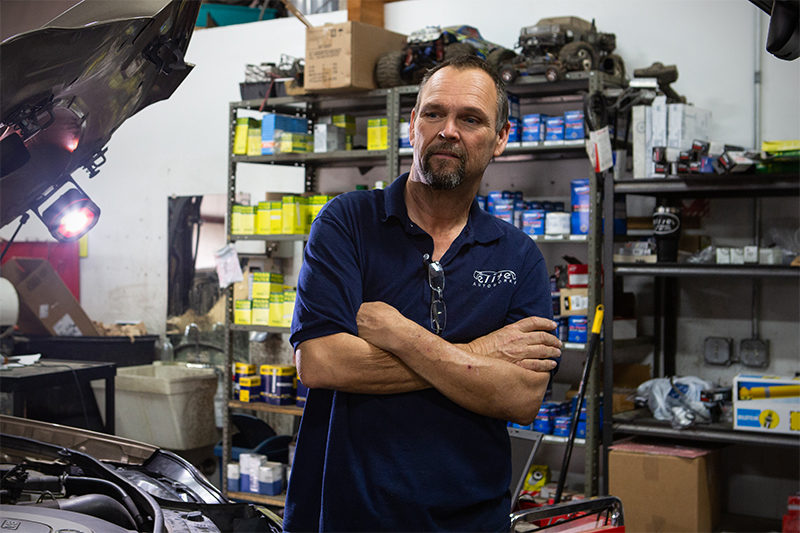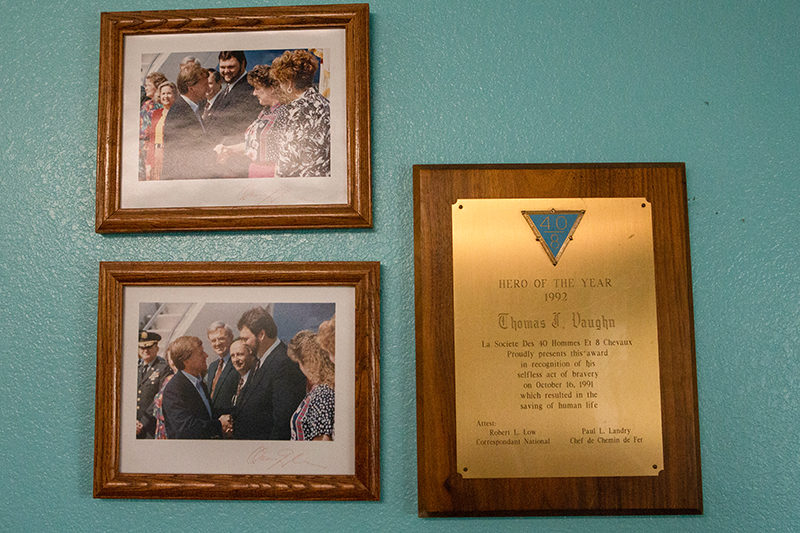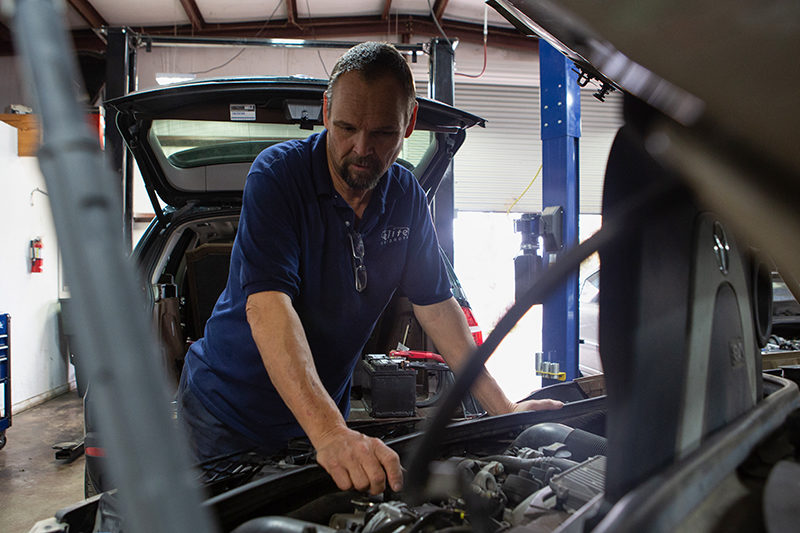28 Years After a Forgotten Mass Shooting in Texas, a Survivor Looks Back
By Jack Keyes
Reporting Texas

Tommy Vaughn has worked as a car mechanic in Belton, Texas, since before the 1991 Luby’s shooting. Cristina Pop/Reporting Texas
On Oct. 16, 1991, Tommy Vaughn, a 28-year-old car mechanic, had what he calls a “weird thought” as he lay on the floor of a Luby’s in Killeen while a gunman opened fire: “What an ugly carpet.”
Vaughn’s 6-foot-6-inch, 349-pound frame almost entirely covered the patch of gray floor covering, but he recalls thinking, “I am going to die on this ugly carpet today.”
Not only did Vaughn survive, but he also helped others do the same after George Hennard, a 35-year-old unemployed merchant seaman, crashed his Ford Ranger pickup into the iconic Texas restaurant before leaping out to shoot and kill 23 people and wound 27 others.
At the time, it was America’s deadliest mass shooting on record.
Today, the Luby’s massacre has faded from public memory, overtaken by an escalating spate of similar killings, including the 2017 Las Vegas shooting, the most lethal to date, in which the shooter killed 58 and injured 422. Faded, too, is the story of how Vaughn’s timely actions may have saved countless fellow patrons.
After “every shooting there is this collective amnesia,” Maria Esther Hammack, a UT-Austin doctoral student in history who researches mass shootings, said. “I’ve considered this … mass forgetting to be a type of both intentional and subconscious healing for people — a way to desensitize or detach ourselves from the pain and the knowledge of such atrocities.”

Workplace photos mark a handshake with then-vice president Dan Quayle; a plaque commends Vaughn’s heroism. Cristina Pop/Reporting Texas
For survivors like Vaughn, the memories don’t go away.
Vaughn and eight coworkers from a local car dealership had paid for their food and were about to sit at the rear of the restaurant when the gunman drove through the big front window and into the serving line. Vaughn had ordered fried fish and vegetables, and he believes it was his decision to pass on dessert, part of his normal Luby’s routine, that saved him.
“I was 349 pounds at that time,” Vaughn told Reporting Texas. “I didn’t get there by not eating dessert,” he said. “Had I stopped even for two seconds to look at the desserts, I would have been right at the serving line where the car stopped.”
Instead, Vaughn and his group hid under a table next to a large back window. At a friend’s urging, he attempted to kick through the glass but only succeeded in drawing the gunman’s attention. Vaughn recalls a woman next to him saying, “He’s coming over here,” and gunshots started striking around them.
Paul Labombard, a co-worker, recalled: “It sounded like light bulbs falling out of the ceiling, but [Hennard] was shooting people.”
In a moment of fight-or-flight desperation, Vaughn stood up and flung his large frame against the eight-foot windows. “I remember thinking I didn’t know you could bend a window [that] far … About the time I saw the frame level with my eye, the window busted and I ended up outside.”
Dozens of restaurant-goers swarmed through the outlet Vaughn had created. About 125 patrons survived in all, including Vaughn and coworkers. The police engaged the gunman in shootout in which he took his own life.
Vaughn needed only eight stitches on his arm — a small price to pay, he feels, for a second chance at life. “I was not the hero. I was trying to save myself,” Vaughn insisted.
For months after the shooting, Vaughn and his colleagues held weekly meetings to help them navigate the aftermath. Labombard, who still works at the same car dealership, says his workers from that time period were like family, and he called the office manager, Pat Atkinson, his angel. Atkinson, who died in 2014, laid on top of him during the shooting to protect him.

The Luby’s massacre has faded from public memory, but Vaughn remembers it as “a life-changing experience.” Cristina Pop/Reporting Texas
Shortly after the shooting, Oprah invited Vaughn and other survivors to appear on her syndicated TV show, and Vaughn even joined then-Vice President Dan Quayle briefly on the 1992 campaign. But the country moved on quickly.
“What is interesting — and incredibly telling of how we remember mass shootings and the casualties in their aftermath — is that very few people today actually know about the Luby’s shooting,” Hammack, whose work contextualizes mass shootings in America, said.
Today, whenever Vaughn goes to a restaurant, he keeps an eye on everyone walking in and out. He sits in a place where he could easily get to safety. Sometimes he wonders if the man who was behind him in line at the cafeteria managed to survive, and he’s wondered why he got to live when so many others did not.
Not all mass shooting survivors cope the same way, and not all of them share the same political views. For instance, while students surviving the 2018 high school shooting in Parkland, Florida, that claimed 17 lives have called for gun control, Vaughn and Labombard are gun owners who believe in the value of citizens carrying concealed weapons.
In hindsight, Vaughn recalls the Luby’s shooting as a traumatizing day but also as the “best day” because it gave him a second chance at life.
After the incident, Vaughn shed weight at a dramatic pace, furthering his belief that it was God’s plan for him to be heavy enough in 1991 to break through that glass wall. He is still a mechanic in the Killeen area, but now, at 55, he weighs 220 pounds.
“There was a man who survived who never could get [the shooting] out of his head,” Vaughn said. “He never really did anything else, and they say it messed him up for the rest of his life. For me, it was a life-changing experience.”
The Killeen Luby’s closed in September 2000, replaced by a Chinese buffet. The ugly carpet Vaughn thought he would die on is long gone.